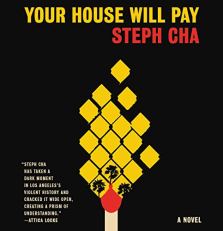
Yesterday’s post delved into the steamy politics surrounding this collection and its new editor’s highly successful efforts to make the selection more representative of the breadth of American crime and mystery writing. Here are some of my favorites from the new collection.
A good example of how criminals paint themselves into tight corners—which once again proves the validity of Murphy’s Law—is E. Gabriel Flores’s story, “Mala Suerte.” In it, Carmelita wonders whether bad luck runs in families. A recounting of her family history suggests it may. But she’s plucky and talks her way into a pretty good job. Now, if only she would leave well enough alone. But she’s one of those people who cannot recognize when she’s about as well off as she has any right to expect, and you know she won’t.
It’s hard to say much about Ravi Howard’s suspense story, “The Good Thief,” without giving away the clever plot twist. A conscientious cook at a small-town luncheonette is asked to prepare a prisoner’s last meal, actually a cake the young man once ate in her establishment. Alone in the kitchen of the prison’s new wing—the biggest kitchen she has ever seen—you are alone with her thoughts, as she talks briefly with the warden and methodically goes about preparing the cake. So little action, so much happening.
Aya de León’s touching “Frederick Douglass Elementary” delves into the crimes a mother will commit in order to get her son into a decent elementary school, when all manner of bureaucracy is set against her. Keisha’s not a serial killer or a bank robber, or someone at the very fringes of society. She’s just a working single mom. Her crimes may seem trivial, but in the lives of her and her son, they are hugely consequential. (You could be forgiven for believing that the real crime is the condition of the schools that tempted her into law-breaking.) Any parent will recognize the stomach-dropping uncertainty that hits Keisha throughout.
In “The Killer,” by Delia C. Pitts, you return to familiar crime-story territory. A mother and small child are on the run from New York to Tampa, with a gangster hot on their heels. The story’s told from the point of view of their driver and bodyguard, who believes every stop along the way risks bringing their pursuer closer and every encounter risks betrayal. They stop at the kind of rural Virginia diner where the manager and cook have never met up with anyone as dangerous as their pursuer, and even that naivete presents a potential risk. First published in the literary magazine, the Chicago Quarterly Review, it’s a nail-biter.
I’d read “One Bullet. One Vote,” by Faye Snowden in the Low Down Dirty Vote collection, liked it then and on repeat. In the mid-1960s, a young Black man from up north has arrived in small-town Louisiana determined to convince his new wife’s relations to register to vote. “What you trying to do? Get us all killed?” His wife’s elderly grandmother is the only one who takes him up on it. Bureaucracy repeatedly thwarts her, but she’s dealt with that before. The author not only created an engaging story of people pushed to extremes, she provides a powerful demonstration of what’s meant by “systemic racism.” Not one, but two true heroes in this one.
Among the other authors included are Jenny Bhatt, Gar Anthony Haywood, Alison Gaylin, and Laura Lippman. If you’re puzzled by the title to the second story in the collection, SWAJ by Christopher Bollen—it’s the logo to the movie ‘Jaws,’ read backward. In some circles, that’s a thing.
On the whole, the selections were excellent, and you may find yourself returning to several of them for the issues and social truths they reveal. In this era of social media bubbles, when we hear mostly from people who share our beliefs and outlooks, seeing the world through the eyes of some of these characters is enormously valuable. If this collection presages what Cha will manage in future editions, they will be well worth looking forward to.
Yesterday: the controversy over editorial direction.





